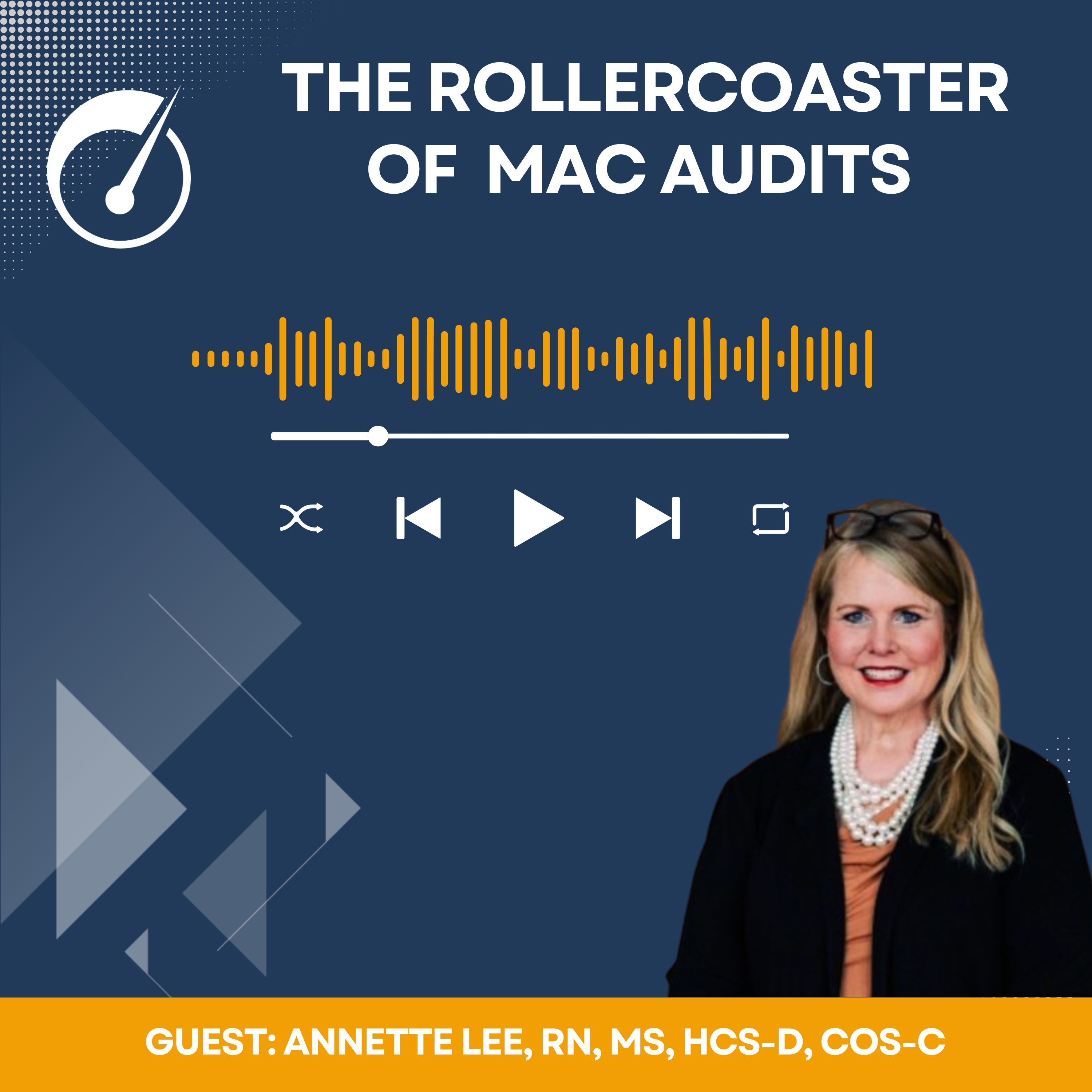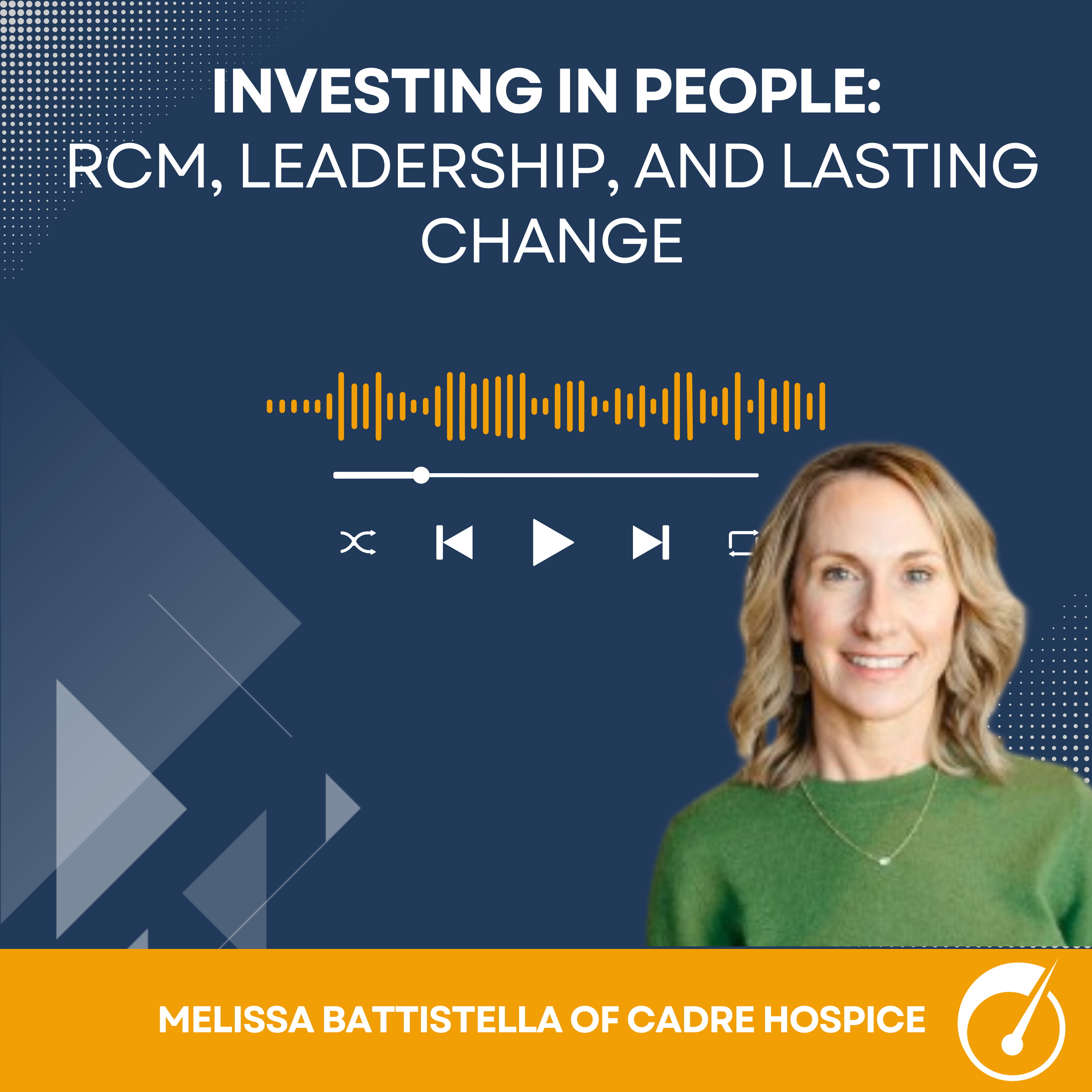Episode Transcript
[00:00:02] Speaker A: Welcome to Home Health Revealed, where we share real stories from industry leaders about home health, palliative and hospice care brought to you by Velocity. Grow your home health or hospice agency with the power of Velocity. Velocity's easy to read coding and revenue cycle dashboards let you grab your cup of coffee and quickly see the health of your organization.
All right, we are at the Alliance 2025 annual conference in New Orleans. And I'm here with one of my favorite favorite conference people. And I don't say that she is definitely on my top list. And you probably know her if you have been to any conferences in this home health and hospice space, because she always comes, she always shows up with her popcorn.
[00:00:45] Speaker B: Gotta have the popcorn.
[00:00:46] Speaker A: Yes, this is Jill Scheckschneider from cantime. Jill, tell us all about you and tell us what you want about Cantime and popcorn.
[00:00:54] Speaker B: Yeah, well, gosh, that's a loaded question. Let's see. I am cantime's director of marketing and events.
So that kind of is a big bubble of. I handle all of our social media. Yes, you do organize webinars and things like that. But the bulk of what I do is any event Cantime is at. Cantime participates in probably about 45 events a year, everything from national shows to golf tournaments to cocoa. With cantime at one of our PPEX in Texas, which is a super incredible thing that doesn't really get a lot of love, maybe. PPEC is a prescribed pediatric extended daycare for medically fragile children that get the opportunity to go to like a facility with all of their therapists and things like that, which allows them the inclusion and to not be just at home with a caregiver. Also gives the parent the opportunity to work. They can go to work and things like that. So we do a lot with Sunshine. Ppac. And they are. They were in Florida, I believe. I believe that's where they started. But they're big in Texas now. So like I said, we do everything.
I'm a very big component of giving back. I do not think from the EMR standpoint or any business, you just sit and take the client's money. You have to give back. You have to participate. I've had many people this year say it's so nice that you invested in us and just didn't collect our monthly fee or what have you. And I had somebody tell me, I think it was in Minnesota that we appreciate you getting to know us outside of the office because we went to a beer brewery tour or something like that. And they like that.
[00:02:44] Speaker A: Yeah, well, that's true partnership.
[00:02:46] Speaker B: Yes.
[00:02:46] Speaker A: Right. It's just not an exchange, a transaction. You guys are so good at doing that, getting out in the community, really caring about the people that are utilizing the Cantime emr. But you provide an incredible solution. Thank you. That's not to be diminished by any means, but you do get out there and do all the things that really do make a difference to enhance the people that you're serving. You really are servants in this.
[00:03:09] Speaker B: You have to give back.
[00:03:10] Speaker A: And of course, the popcorn, everybody wants the popcorn.
[00:03:13] Speaker B: A little bitty quick backstory. I don't like sweets. You know that.
I'm not a sweet person.
I'm a salty, spicy person.
And you could take that. However, starting. I've been with cantime going on nine years. And you know, as I started coming into this, everybody's giving away candy and I'm just like, er, I don't want to go buy a bag of chocolate and give it out because I don't want to eat it. So.
[00:03:37] Speaker A: And giveaways that these things are important. People come for the giveaways.
[00:03:40] Speaker B: Your swag is your symbol. So years ago, both my daughters who are grown now, they played AAU basketball. So we always had a fundraiser of selling popcorn through this particular company. And I was like, huh, let me see. So I contacted them because it's not a retail type of thing. You can only do it through a business.
[00:04:00] Speaker A: Yeah.
[00:04:00] Speaker B: And I said, do you do this? Could you do that? And they said, yeah. So literally, for, I don't know, probably eight years, I send them a list every month of every show I'm going to be at, how many I want to come, they ship to the hotel or the convention center and. And we bring it out. There's probably, I don't know, eight or nine different flavors. And we are known. We have people come up and say, where's your popcorn?
[00:04:25] Speaker A: Yeah, you sent me a box for Christmas and I loved it. Actually, my kids stole most of it and they were in individual bags, so they put it into their lunchbox. So can time. Their kids that sit at their table are like, when are you getting that can time popcorn?
I think we have somebody. So it's so cool we get to have people come by and just talk to us and sit with us. So Jill and I are just going to co host here. We're just going to talk and sit down. Welcome, welcome. This is Ashley. Ashley, tell us who you are and who you're with.
[00:04:53] Speaker C: My name is Ashley. I'm the administrator at Complete Home Health in Lafayette, Louisiana. So I'm just about two hours down the road.
[00:04:59] Speaker A: Yeah. In Lafayette.
[00:05:01] Speaker C: Yep. Close by.
[00:05:02] Speaker A: All right, so you just got to drive down. Is New Orleans like a regular stop for you? Do you come down here for stuff? Really?
[00:05:08] Speaker B: Are you a saints man?
Yeah, unfortunately, my husband's from here, so we. We cry on Sunday.
[00:05:14] Speaker C: Yeah. They're hard to watch right now.
[00:05:16] Speaker B: Yeah.
[00:05:16] Speaker C: But yes, I was just here last weekend. We're here all the time, so. Yeah.
[00:05:19] Speaker A: Oh, that's fun. This is my first time, so I loved getting to go see the sights, do all the things, got the coffee, have had seafood. I mean, experiences and things that. Yes. Did the beignets from where though? Cafe Dumond is No.
[00:05:33] Speaker B: Oh, she's saying no.
[00:05:35] Speaker A: Oh. Oh, do tell. Where should I get beignets before I leave tomorrow?
[00:05:39] Speaker C: Cafe Beignet.
[00:05:40] Speaker A: Okay.
[00:05:41] Speaker C: Yes, there's.
[00:05:41] Speaker A: That sounds legit.
[00:05:42] Speaker C: At least two locations, maybe three. But I promise you they're better than Cafe Dumont.
[00:05:48] Speaker A: Okay.
[00:05:48] Speaker C: Yep.
[00:05:49] Speaker A: Well, it's kind of nice that they're having this in your neck of the woods down here. So it's nice and close.
Kind of. Tell me what you're think, what are some of the challenges you came maybe to solve or what are you learning while you're here? Tell me about the conference itself, the.
[00:06:01] Speaker C: One I've been the. So far, what I've enjoyed the most is when I just left and we were talking about how to advocate to the legislators and to our government, to our White House, because they make decisions for us and have no idea what we're doing because they're behind us and just get to read papers and check boxes. And if you don't check enough boxes, then you're not doing a good enough job. That's my main focus this weekend, is just learning how to advocate better for our agencies, for our state. Not just our state, but home health in general. Because we have such. We do so much good for our communities.
[00:06:37] Speaker A: Absolutely.
[00:06:38] Speaker C: We get penalized more for it than we get, you know.
[00:06:41] Speaker A: Yeah, you're right.
[00:06:42] Speaker B: You're right.
[00:06:43] Speaker A: I mean, from my perspective, as my humble perspective, home health and hospice are saving so much money for our health care system. Preventing hospitalizations, providing that one on one care that just. You can't substitute it for anything else. You know, we're not going to be able to AI a patient into, you know, better care. We've got to have those patient facing clinicians who are going out, giving the care and they put their heart into what they do. I've not met a clinician yet, especially on the hospice side. I'll just now, hospice, clinicians. It's a caller. Totally.
[00:07:16] Speaker C: I.
[00:07:16] Speaker A: 100%. Jill. I agree with you. It is a calling. And people who can't hack it usually are gone within.
Yeah. Pretty wiggly. And those who are in it, they live.
Is a type of living.
[00:07:30] Speaker C: It is.
[00:07:31] Speaker A: And so, yeah.
[00:07:32] Speaker C: And what we do primarily, our agency specifically, is private duty nursing.
[00:07:37] Speaker A: Okay.
[00:07:37] Speaker C: So it's not just traditional Medicare in and out house. We are sending LPNs to homes for 12 to 18 hours a day. Some patients we take care of 24 hours a day. And it's a very niche home health industry.
And it's hard work, it's hard to do. It's hard to keep staff in these homes and the situations that we have to work in 12 and 18 hours a day. But if we didn't do what we do, our patients would be institutionalized or not make it as long as they do. You know, they come home from the hospital here in New Orleans on ventilators. They have traches, they have peg tubes, they have total care. So we're able to provide a huge service to these families that they can live some sort of a normal life and have staff in the home that can take care of their kid or.
[00:08:19] Speaker B: They want to be home. They want to be in their home. They don't want to be in the hospital. They don't. Yeah.
[00:08:23] Speaker C: And their kids, I mean, mostly their kids. But then we have people that have quads from accidents, things like that. But if we didn't do what we do, they would not live as long as they do.
[00:08:32] Speaker B: Right.
[00:08:32] Speaker C: And they wouldn't live at home for sure.
[00:08:34] Speaker A: Yes.
[00:08:34] Speaker C: So it's just. It's hard to advocate for because like I said, the government, I mean, they just want to take.
[00:08:41] Speaker B: I think if you're not in this bubble and you don't know something, you don't. I had an agency, I keep his line. He's like, I don't know what I don't know. And that's, you know, people don't understand if you've not had a child or something that's had to go through a situation like that, you just think, okay, you get sick, you go to the doctor, and that's that. And this bubble is so much bigger and so much more important. And when you have those people making decisions that have no clue, it's frustrating and it's upsetting sometimes because like you said, you're not in the bubble.
[00:09:15] Speaker A: Right. It's a disconnect. It's a disconnect from the policy and the policymakers to the real life, practical day in, day out, what it looks like on a Tuesday at 2:15 in the afternoon or whatever, when that patient really needs somebody.
And you mentioned staffing, right? A lot of these policies are impacting staffing because when you're an agency, you're required to have so many staff, you're required to do so many visits, you're staying compliant, you have documentation, yada, yada, yada. The list goes on and on from a compliance standpoint. But then that can also create burnout, create frustration. I mean, you're dealing with it from a staffing perspective. What do you think? Or is there something that from a policy perspective we could do that would help keep staff with staff retention?
[00:10:03] Speaker C: Oh, my gosh. That's such a loaded question.
[00:10:05] Speaker A: I know. Sorry, I just threw that.
[00:10:07] Speaker B: Threw that one at your 30 seconds.
[00:10:09] Speaker C: No, no. But you know what? I will say us, the four of us are here as a team, but we really, it's really important to let your team know that they're appreciated. It's not always about how much you can pay them, because we love our team. Because without them, they do the work. They're on the ground. They're taking care of these people and keeping them safe, healthy out of hospitals. And we make sure that we acknowledge them all the time.
[00:10:34] Speaker B: You got to give back. We were just talking about. And everybody kind of. They talk about the love languages.
[00:10:39] Speaker A: Yes.
[00:10:40] Speaker B: That's where my mind went to. They want a high five. Somebody wants a trophy. And somebody just wants a social media post that says, you did a great, but you got to find what works. You really do.
[00:10:49] Speaker C: And we have.
I can say we have found it. We use this new program, and I'm not advertising or whatever, but it's called Coach Up Care by Mission Care Collective. And so it's an app that we use just for your agency and whatever. But the nurses love being recognized. Happy birthday. Or you got a nice letter from this patient. I mean, it's amazing. They love being recognized.
[00:11:11] Speaker A: Yes.
[00:11:12] Speaker C: As well as getting little perks, you know, here and there. They, of course, we give them bonuses and those kind of things, but because we can't pay them what we want to pay them because of what reimbursement is. Being recognized has gone such a long way. We have so much longevity because we really do love our nurses, our staff, and take care of them.
[00:11:29] Speaker B: That makes a difference.
[00:11:30] Speaker C: It does. It does.
[00:11:32] Speaker A: And it doesn't cost anything but time and consideration, thoughtfulness. I mean, those are things that are missing in some, in some cultures of some agencies. And so if you're out there and you're thinking about different ways to acknowledge your staff and you think, ah, that, you know, if I can't pay them more, how am I, how am I going to attract them?
[00:11:49] Speaker B: Right.
[00:11:49] Speaker A: Maybe send them some can time popcorn.
[00:11:51] Speaker C: Yeah.
[00:11:53] Speaker B: You've got to find out what motivates because like I said, some people really just want to high five. Like, you did a great job. That's all they need. And then you've got somebody else that wants a $10,000 bonus. You got a balance.
[00:12:05] Speaker A: Well, I need the one that wants a good squeeze.
[00:12:07] Speaker C: Yeah.
[00:12:08] Speaker B: And I got the popcorn.
[00:12:09] Speaker A: Yeah, exactly. Well, hey, Ashley, thank you so much for sitting down with us. It was great to hear from you.
[00:12:14] Speaker C: Thanks.
[00:12:15] Speaker A: And Jill, thank you for co hosting with me.
[00:12:17] Speaker B: It was an honor.
[00:12:18] Speaker A: Do this again.
[00:12:19] Speaker B: It was, it was an honor.
[00:12:21] Speaker A: Thank you. Thank you.


